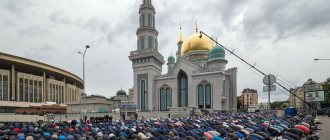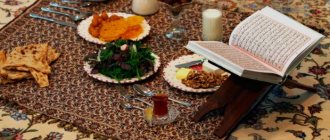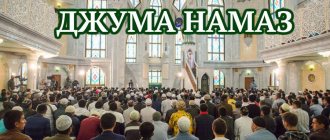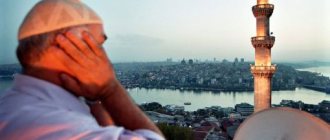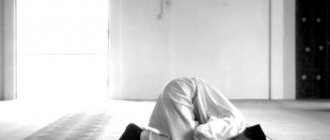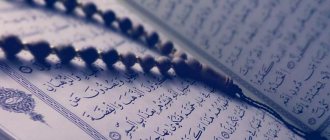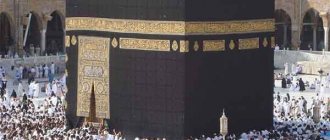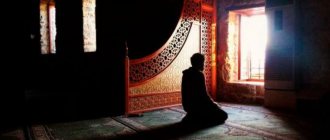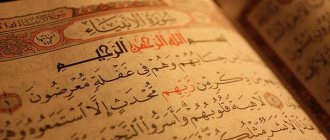- What is Eid Prayer?
- Days for performing two holiday prayers
- When is Eid prayer performed?
- Qur'an on Eid Prayers
- Holiday traditions
- Place of occurrence
- Features of the days of the holiday and actions before and after the holiday prayer Breakfast on holidays
- Desirable and obligatory actions before Eid prayer
- Pronouncing takbirs
- How many rak'ahs does the holiday prayer consist of?
Holiday prayer or Eid prayer , salat ul-Id is a prayer that Muslims perform on the days of the main Muslim holidays, that is, on the days of Eid al-Adha and Eid al-Adha. These two holidays are also called Idein. This prayer is also called “Eid prayer”, since the word “Eid” comes from the word “aud”, which means “renewal” or “return”. These two concepts are connected by the fact that Muslims rejoice at the coming of the holidays, and every year on these days joy returns to their homes.
Eid prayer is performed by all Muslims of the world, but according to the requirements of different madhhabs, performing such a prayer can be both obligatory and desirable. Hanafis require obligatory observance of the holiday prayer as wajib, that is, an obligatory action, and representatives of the Shafi'i and Maliki madhhabs read that performing such a prayer is sunnah-muakaddah. Hanbalis are of the opinion that performing prayer on holiday is fard.
When is Eid prayer performed?
The holiday prayer should begin half an hour after the sun rises: from this moment it is customary to read the prayer of the spirit - this is the period from the moment the sun rises to the height of a spear, it comes after sunrise ten to fifteen minutes, and the time for Eid prayer when Zuhr prayer begins.
In the hadith transmitted by Abu Dawood and Ahmad, there is a case when the Prophet Muhammad ﷺ was told by horsemen returning from a trip that they saw a young crescent of the month in the sky, and then the Messenger of Allah ﷺ told the Muslims to begin breaking their fast, and then said to In the morning, Muslims gathered together to perform collective prayer.
Salavat, read after two rak'ahs in tarawih prayer:
اللَّهُمّ َ صَلِّ عَـلَى سَيِّدِنَا مُحَمَّد وَعَـلَى آلِ سَيِّدِ نَا مُحَمَّد بـِعَـدَدِ كُلِّ دَاءٍ وَدَوَاءٍ وَ بَارِكْ وَسَلِّمْ وَعَلَيْهـِمْ كَثِيرًا
Allahumma sally 'ala sayyidina Muhammad wa 'ala ali sayyidina Muhammad bi'adadi kulli dain wa dawain wa barik wa sallim 'alayhi wa 'alayhim kasira.
Qur'an on Eid Prayers
As Allah Almighty says in Surah “The Highest” of the Holy Book of the Koran: “ he who purified himself, remembered the name of his Lord and performed prayers succeeded .” Allah Almighty commands in the Quran for Muslims to perform prayer and slaughter a sacrifice for the sake of the Almighty.
According to a number of learned theologians, in Surah “The Highest” of the Holy Book of the Koran it is said specifically about the holiday of Eid-al-Fitr, and the words “ successful is he who purified himself ” is said about the payment of zakat, by remembrance we mean the exaltation of Allah Almighty on the night before the holiday of Eid al-fitr, and by performing namaz we mean performing the holiday prayer.
In the sura of the Koran “Abundant”, according to Muslim scholars, it is said about the holiday of Eid al-Adha, there are also words about performing prayer for the sake of the Almighty, which implies Eid prayer, and there are words about slaughtering a victim, which indicates a holiday sacrifice.
Holiday traditions
festive prayer in Moscow
After the migration of the Prophet Muhammad ﷺ to Medina from Mecca, the Ansars began to celebrate only two holidays during the year, which came to them from the period of jahiliyya. Allah Almighty changed these holidays to Eid al-Fitr and Eid al-Adha, and these holidays began to represent the end of the Hajj and fasting in the month of Ramadan, and these holidays are not only two great types of worship of Allah Almighty, but are included in the two pillars of Islam.
There is a case when, upon the arrival of the Prophet Muhammad ﷺ in Medina, the inhabitants of Medina had fun and entertainment for two days, and the Messenger of Allah ﷺ told them that instead of these two days, Allah Almighty granted people the Festival of Breaking the Fast and the Festival of Sacrifice, Eid al-Fitr and Kuran - Bayram.
Place of occurrence
They perform Eid prayer in the same place in which the Prophet Muhammad ﷺ performed it - open, because it is mentioned in the hadiths transmitted in the collections of Bukhari and Muslim that the Prophet Muhammad ﷺ first went on the Feast of Breaking the Fast of Eid al-Fitr and on the Feast of the Sacrifice of Eid al-Fitr to a special place for prayer, and then turned to face the rows of Muslims sitting behind him and began to read a sermon to them, and then explained the questions that interested them and gave the necessary instructions. It is also mentioned that this place where the Prophet Muhammad ﷺ prayed was not located in the city: the Messenger of Allah ﷺ together with the Muslims went outside the city, located in an open place, and this choice of place emphasized the festive atmosphere of this day.
Muslims of all ages, both men and women, children and old people, took part in the celebration of Eid al-Adha and the Day of Sacrifice. Holiday prayers on the days of Eid al-Fitr and Eid al-Adha were performed collectively in an open place, and such prayers are unique symbols of the unity of Muslims, showing the strength of the unity of Islam.
The Righteous Caliphs Abu Bakr, Umar, Usman and Ali also performed Eid prayers on the days of Eid al-Adha and Kurban Bayram together with the people in an open place. According to a number of scholars, it is preferable to pray in a mosque on holidays if it is not possible to go to an open place, since it is located very far away or bad rainy weather prevents it. During the reign of Caliph Uthman, the inhabitants of Medina, if the holiday was rainy, performed such a collective prayer in the mosque.
All Muslims of the community take part in the holiday prayer. It is reported from the words of Umm Atiyah that on the days of these holidays all Muslims should go out into the streets, and even those girls who were unmarried, as well as those women who were menstruating on that very day, also came to the place where the holiday prayer was performed. , although they stood behind all those praying, they also said takbir and turned to Allah Almighty with prayer.
What does the tarawih (teravih) prayer mean?
Sheikh 'Ubaydullah al-Mubarakfuri wrote: “Know that tarawih, and qiyamu Ramadan (standing night prayers in Ramadan), and Qiyamu-lleil (night prayer), and tahajjud are all the names of the same prayer. And tahajjud in Ramadan is tarawih, since nothing is transmitted from the prophet (peace and blessings of Allah be upon him), neither reliable nor weak, so that he would perform two prayers in Ramadan, one of which is tarawih, and the other tahajjud. And tahajjud is not in Ramadan - this is what is called tarawih in Ramadan.” See “Mir'atul-mafatih” 2/224.
It becomes clear that the Terawih prayer in Ramadan is the same night prayer not in Ramadan. The only difference is that it is better to do it in a jamaat (group) than alone, for which we will give reasons below, in sha Allah.
How many rakats are there in Tarawih prayer?
Scholars disagree on the number of rak'ahs in this prayer. Opinions have been expressed that terawih includes 8 rak'ats, 11, 13, 20, 21, 24, 28, 36, 38, 41, 47 rak'ats. Also among these opinions is that night prayer, whether in Ramadan or at any other time, does not have any restrictions, and a person can perform as many rak'ats as he wishes. See “al-Ikhtiyarat”, “Majmu'ul-fataua” 22/272-273, “Irshad as-sari” 3/423, “Fathul-Bari” 4/204, “'Umdatul-Qari” 5/356.
The strongest opinion is that transmitted from the mother of the faithful Aisha, may Allah be pleased with her. It is reported that to the question: “How did the Messenger of Allah (peace and blessings of Allah be upon him) pray on the night of Ramadan?” “Aisha replied: “Neither during Ramadan nor in other months did the Messenger of Allah (peace and blessings of Allah be upon him) perform prayers of more than eleven rak’ats at night . al-Bukhari 1147, Muslim 738.
Imam Malik said: “What ‘Umar ibn al-Khattab gathered people together is the most beloved to me, and it was eleven rak’ats, and it was the prayer of the Messenger of Allah (peace and blessings of Allah be upon him).” He was asked: “Eleven rak'ats with uitr?” He said, “Yes, but thirteen is close to right.” Then he said: “And I don’t know where people got these numerous bows from the waist!” See “al-Masabih fi salati-tarauih” 2/77, “Tankida-ssadid bi risalati ijtihad wa-ttaqlid” 266-268.
Is it better to perform night prayers in Ramadan (Ramadan) alone, at home or in a mosque with a jamaat?
Zaid ibn Thabit reported that once the prophet (peace and blessings of Allah be upon him) during Ramadan set up a tent in the mosque in which he prayed at night. And after that, people began to gather around him, praying behind him. Then one night they stopped hearing his voice, and thought that he was sleeping and began to make noise so that he would come out to them. Then the Prophet (peace and blessings of Allah be upon him) came out to them and said: “What’s wrong with you, why don’t you stop doing what I see? After all, I am afraid that this prayer will be made obligatory on you. And if it becomes obligatory for you, then you will not be able to do it! Pray, O people, in your homes! Truly, the best prayer for a person is prayer in his home, not considering it obligatory!” an-Nasai 1599. The hadith is reliable, and its basis is also given by al-Bukhari.
Also, the Prophet (peace and blessings of Allah be upon him) said: “A person’s voluntary prayer, performed where people cannot see him, is twenty-five times superior to prayer performed in public!” Abu Ya'la, ad-Dailami. The authenticity of the hadith was confirmed by Hafiz al-Munziri and Sheikh al-Albani. See Sahih al-Jami' 3821.
At the same time, most scholars relied on the understanding of Umar ibn al-Khattab, may Allah be pleased with him, who, during his caliphate, ordered tarawih to be performed in a mosque behind one imam. And this was not something new. People performed group prayer behind the Messenger of Allah, may Allah bless him and grant him peace, and the Messenger of Allah, may Allah bless him and grant him peace, worried that the group prayer of Terawih in Ramadan would become obligatory for his ummah, ordered it to be done at home. However, after Allah took it to Himself, the position of obligation subsided and the performance of night prayer in the month of Ramadan in the jamaat remained a hukm (position) that was desirable, but not obligatory. Reasons for this:
From Muhammad, the Messenger of Allah, may Allah bless him and grant him peace, it is narrated: “Verily, a person who prayed with the imam until he left is like one who stood in prayer all night.” Abu Dawud 1375, an-Nasai 1364. The authenticity of the hadith was confirmed by Abu 'Isa at-Tirmidhi, Ibn Khuzaima, Ibn Hibban and al-Albani.
Abu Dawud said: “I heard Imam Ahmad asked: “Do you prefer that a person prays with people during Ramadan or that he prays alone?” He replied: “I prayed with the people.” He also said: “I would prefer that a person stand the night prayer with the imam and perform Witr also with the imam, because the Prophet (peace and blessings of Allaah be upon him) said: “Verily, a person who performed all prayers with the imam, until then, until he left, like one who stood in prayer all night ." See “al-Masail Abu Dawud” 62.
Moreover, Imam Ahmad believed that performing the tarawih prayer in the jama'at in the mosque during the first part of the night is better than performing it alone at home during the third part of the night. And this opinion was also chosen by Sheikh al-Albani.
However, there is no doubt that those who prefer to perform the tarawih prayer at home do not deserve any reproaches or censures, especially since the arguments on this side are very strong.
A Muslim should also take into account his condition, where he will be more humble and focused in performing tarawih - alone at home or in a mosque with a Muslim jama'at. Hasan al-Basri gave an excellent instruction when he was asked: “O Abu Sa'id, Ramadan has come, so where do you advise me to pray, alone or with the Muslim jama'at?” He replied: “Truly, you are a person who has the right to choose this for yourself! Look at both options and follow what your heart is inclined to, and where you can better stand prayer!” Ibn Nasr in “Qiyamu-llayl” 231.
Good to know: how to spend the night of Predestination (Power) in Ramadan
What to do if the imam in the mosque performs terawih prayers of 20, 21 or more rakats (i.e. more than 11)
The number of rak'ahs in the night prayer in Ramadan is a matter of legal (fiqh). And each madhhab has arguments for the legitimacy of this or that quantity. Below we will provide a link to a more detailed study, but for the sake of understanding, we will present several arguments for the legitimacy of increasing the number of rakats of night prayer, as many scientists have pointed out:
One day, Qurayb reported to Ibn 'Abbas that Mu'awiyya performed the night prayer ('isha), and then performed the witr of one rak'at, which he did not increase. Then Ibn 'Abbas said: “He did the right thing, O son! None of us is more knowledgeable than Mu'awiyah. Witr can be done in one rak'at, or in five, or in seven, or more. You can perform Witr as much as you wish!” 'Abdur-Razzaq 4641, al-Bayhaqi 4572. The Isnad is reliable, and the basis of this message is also given in al-Bukhari 3784.
Also, the Prophet (peace and blessings of Allaah be upon him) said: “Truly, the most beloved prayer for Allah is the prayer of Prophet Dawud, peace be upon him, who slept half the night, prayed for a third of the night, and then slept for a sixth of the night.” al-Bukhari 3238, Muslim 1159.
Also, the Messenger of Allah (peace and blessings of Allah be upon him) once said: “Truly, 'Abdullah (Ibn 'Umar) is a righteous man, but if only he performed more prayers at night!” Al-Zuhri, who reported this hadith, said: “And after this 'Abdullah began to perform many prayers at night . al-Bukhari 7030.
And Ibn 'Umar himself said: “I perform prayer the way my companions performed it! And I do not forbid anyone to perform prayer at night and day as much as he wishes, except for the period of sunrise and sunset . al-Bukhari 589.
This opinion that night prayer has no restrictions was held by many salafs, including the companions, and some imams generally conveyed a unanimous opinion on this issue:
Hafiz Ibn 'Abdul-Barr said: “The scholars are unanimous that there are no restrictions or specifications in the night prayer, and that it is a voluntary prayer. And whoever wishes, let him prolong the standing (reading) and reduce the number of rak’ats, and whoever wishes, let him increase the number of prostrations and bows!” See al-Istizkar 5/244.
Qadi 'Iyyad said: “There is no disagreement among scholars that the night prayer has no restrictions that cannot be exceeded or reduced. Night prayer is one of those benefits, which if you increase, the reward increases. As for the disagreement, it was precisely in how the prophet (peace and blessings of Allah be upon him) performed the night prayer and what he chose for himself.” See Sharh Sahih Muslim 6/19.
Hafiz al-Iraqi said: “All scholars agreed that there is no limitation to night prayer!” See “Tarh at-tasrib” 3/50.
Comment
Many in our time, taking the opinion that it is correct to perform Tarawih prayer in 11 rakats, accuse those who perform more rakats of innovation. As we see from the arguments above and the words and actions of the great scientists of the first generations, there were those who considered it permissible to increase the number of raakats in this prayer. And taking into account the reliable hadith : “Truly, a person who performed prayers with the imam until he left is like one who stood in prayer all night.” (Abu Dawud 1375, an-Nasai 1364), I would like to advise brothers and sisters not to be troublemakers, the severity of sin during this month of Ramadan may be greater than in another month. Choose from what is allowed:
- or perform terawih prayer for the imam in the mosque for as many rakats as he will do in accordance with the madhhab and receive the reward of standing the whole night;
- or find a mosque where they do 11 rakats;
- or perform namaz of 11 rak'ahs at home alone (as the Prophet (peace and blessings of Allaah be upon him) commanded, and as, for example, Ibn Umar did, as Nafi spoke about' (Ibn Abu Shaiba 2/166, authentic isnad);
- or perform Taraweeh prayer at home with your family. Argument : Jabir said: “Once Ubay ibn Ka'b came to the prophet (peace and blessings of Allah be upon him) and said: “O Messenger of Allah, verily, they demand from me to allocate for them some night of Ramadan!” The Prophet (peace and blessings of Allaah be upon him) said: “What are you talking about, O Ubay?” He replied: “The women of my house, they say: “Truly, we do not read the Koran, can we pray with you?” Ubay said: . ” Abu Ya'lya 1801, Ibn Nasr 1/91. Hafiz al-Haythami, Sheikh al-Mubarakfuri and Sheikh al-Albani confirmed the authenticity of the hadith.
For example, in the sacred mosque in Mecca and in the mosque of the Prophet, peace and blessings of Allah be upon him, in Medina, more than 20 rak'ahs are also performed in the Taraweeh prayer. Would you really get up after 8 rakats and leave?
Therefore, show wisdom and do as al-Hasan al-Basri advised, may Allah have mercy on him: “Truly, you are a person who has the right to choose this for himself! Look at both options and follow what your heart is inclined to, and where you can better stand prayer!” Ibn Nasr in “Qiyamu-llayl” 231.
If you cannot accept praying in a mosque with an imam due to more rakats or chanting after each of the 4 rakats, which is common among Hanafis/Sufis, then simply do not go there. And this is closer to moving away from sin. We ask Allah Almighty for what Umar ibn al-Khattab (may Allah be pleased with him) asked him to do, who said: “We resort to Allah for protection from the evil of turmoil!” al-Bukhari 7089.
When is the best time to pray Taraweeh?
Imam an-Nawawi said: “The time for prayer of tarawih begins with the end of the night prayer ('isha), as al-Baghawi and others spoke about, and lasts until dawn.” See al-Majmu' 3/526.
This applies to any night prayers, be it Tarawih, Tahajjud or Witr. 'Aisha said: “The Messenger of Allah (peace and blessings of Allah be upon him) performed night prayers at eleven rak'ats in the period after the end of the night prayer and before the onset of the morning prayer . Muslim 736.
The Messenger of Allah (peace and blessings of Allah be upon him) said: “Truly, Allah has strengthened you with one more prayer, and this is Witr! So perform it between night and morning prayers!” Ahmad 6/397, at-Tahawi 1/250. Reliable hadith See “as-Silsilya as-sahiha” 108.
However, the best time for night prayers is the last third of the night, as the Messenger of Allah (peace and blessings of Allah be upon him) reported on this, saying: “ Let the one who fears that he will not be able to wake up at the end of the night, perform Witr at the beginning of it, and whoever wishes to perform Witr at the end of the night, let him do so, for, verily, prayer at the end of the night has witnesses (angels), and this is better! Muslim 755.
Features of the days of the holiday and actions before and after the holiday prayer
The Messenger of Allah ﷺ on the day of Eid al-Adha (Feast of the Sacrifice) or Kurban Bayram was in a hurry to perform the festive prayer as quickly as possible, but on the day of Eid al-Fitr or Eid al-Fitr he was in no hurry to perform the Eid prayer. According to scholars, the Messenger of Allah ﷺ did this because on the day of Kurban Bayram the sacrifice should be made at the beginning of the day, so the Prophet Muhammad ﷺ tried to make sure that all Muslims had time to do this.
Breakfast on holidays
- A Muslim should have breakfast before starting prayer on Eid al-Fitr (Eid al-Fitr).
- Before starting the festive prayer on the holiday of Eid al-Adha (Eid al-Adha), it is better for a Muslim not to eat.
As an example, they refer to the hadith transmitted by Ahmad and At-Tirmidhi, which states that the Prophet Muhammad ﷺ on the Day of Breaking the Fast first had breakfast, and only then left the house, and on the day of the Feast of Sacrifice, he first performed the holiday prayer, and only then had breakfast.
Desirable and obligatory actions before Eid prayer
- Muslims should go to Eid prayer on foot, as this is in accordance with the Sunnah, as Ali said in the hadith narrated by At-Tirmidhi.
- Worshipers should set off early with the intention of getting a front row seat and earning the reward of waiting for salah.
- It is also Sunnah that on the way to the place of performing namaz, a Muslim should say takbir (the words “Allahu Akbar”) many times, as well as other dhikrs.
- Before going to the holiday prayer, Muslims should wash themselves, dress in beautiful and clean clothes, and men should also anoint themselves with incense.
- During the journey to the place of festive prayer, as on any other day, Muslims must not be arrogant, they must show humility before Allah, and Muslim women must behave modestly, not wear perfume or other perfume when leaving the house, and also choose clothes that would not attract attention.
- The imam should leave the house later for Eid prayers in order to arrive at the beginning of the khutbah, as he should do for Friday prayers, but this does not apply to those cases when the imam has fears that something may delay him and prevent him from coming during.
- A number of scholars are of the opinion that the imam should not come in advance before the prayer because people, seeing the appearance of the imam, stop saying takbir - this happened with some companions, therefore it is advisable for the imam not to be with the rest of the worshipers before the beginning of the prayer, this will be more consistent with the status and mother.
- The imam should wear the best clothes he has for the festive prayer, but the clothes should not be so luxurious that it does not upset poor Muslims and does not repel them, but also the imam’s clothes should not be too simple so as not to repel them. him wealthy Muslims.
- Muslims should go to Eid prayer along one road and return home along another road, since the hadith transmitted by Al-Bukhari says that the Prophet Muhammad ﷺ always returned from prayer by another road.
Pronouncing takbirs
It is advisable to recite takbir as often as possible on the night before the holidays, since in the Holy Quran in Surah “The Cow” the words of Allah Almighty are given that the Almighty wants Muslims to “ complete a certain number of days ,” meaning days of fasting, as well as " exalted Allah ", meaning takbir.
Also, a number of scholars believe that pronouncing takbir is an obligatory action. Takbir should be pronounced loudly, this should be done both at home and on the way to the place where the holiday prayer will be performed, as well as while being at the place where the holiday prayer is performed.
The recitation of takbir should be completed when the imam begins to perform the holiday prayer.
The takbir should be pronounced like this: “ Allahu Akbar, Allahu Akbar, Allahu Akbar, la ilaha illa Allahu, Allahu Akbar, Allahu Akbar, wa li-Llahi-l-hamd .”
To pronounce takbir, one should not establish a leader or agree to pronounce takbir together, since this does not correspond to how the Prophet Muhammad ﷺ acted in these cases, and therefore is a matter close to innovation.
Prayer (tasbih) read after every fourth rak'ah in tarawih prayer:
سُبْحَانَ ذِي الْمُلـْكِ وَالْمَلَكـُوت، سُبْحَانَ ذِي الْعِزّةِ The All rights reserved. حَانَ الْمَلِكِ الْحَيِّ الَّذِي لاَ يَنَامُ وَ لاَ يَمُوت، سُبُّوح قُدُّوسٌ رَبُّنَا وَرَبُّ الْمَلآءِكـَةِ وَالرُّوح، لآ إلهَ إلاَّ اللهُ نَسْتَغْفِرُ اللهَ نَسْأَلُكَ الْجَنَّة َ وَنَعُوذ ُ بِكَ مِن َ النّـَار
Subhana zil-mulki wal-malakut, subhana zil-'izzati val-'azamati val-kudrati val-kibriyai wal-jabarut. Subhanal malikil maujudi, subhanal malikil ma'budi, subhanal malikil hayi llyazi la yanamu wa la yamut, Subbuhun quddusun rabbuna wa rabbul malyaikati warrukh, La ilaha illya Allahu nastagfiru Allah nasalukal jannata va na'uzu bika minan nar.
Procedure for performing Eid prayer
Muslims should not perform other prayers after the Eid prayer, as well as before it. For holiday prayers, the adhan is not read and the iqama is not read. The hadith reported by Abu Dawud says that the Messenger of Allah ﷺ performed the Eid prayer without azan and iqama.
The holiday prayer is performed before the start of the sermon or khutbah (in the hadith transmitted by Muslim and Al-Bukhari, it is mentioned that both the Prophet Muhammad ﷺ and Umar and Abu Bakr performed holiday prayers before the start of the sermon), in contrast to the juma prayer, in in which the khutbah is read before Friday prayers.
Also in the hadith transmitted by Muslim and Al-Bukhari, it is said that the Messenger of Allah ﷺ did not pray either before or after the two-rakah prayer.
How many rakats does the holiday prayer consist of?
The holiday prayer includes two rak'ahs. There are several options for performing holiday prayer. Let's mention the most common ones: 1) in the first rak'ah : 1. They say takbirat-l-ihram (the words “Allahu Akbar”, which begin any prayer); 2. Pronounce dua al-istiftah, which is read after the introductory takbir 3. Next, you should say the takbir “Allahu Akbar” six more times, raising your hands each time when pronouncing. According to many Islamic theologians, a different number of takbirs is also allowed (for example, three or seven) 4. Next, the imam reads Surah Al-Fatihah out loud (and Muslims repeat after him silently), after which an additional sura is read; The hadith transmitted from Ibn Mas'ud says that between takbirs, Ibn Mas'ud said the words “Allahu Akbar kabiran, wal-hamdu lillahi kasiran, wa subhanallahi bukratan wa asyl,” and scholars believe that it is also advisable for Muslims to do this. After this, the festive prayer is performed like any other prayer until the second rak'ah. 2) second rak'ah : 1. At the beginning of the second rak'ah, not seven, but five takbirs are read, although in this matter some imams adhere to a different number 2. The imam reads Surah "Al-Fatiha" and any other sura; 3. Next, prayer is performed in the same way as any other. The hadith reported by Abu Dawud says that the Messenger of Allah ﷺ said that during the holiday prayer one should glorify the Almighty in the first rak'ah with seven takbirs, and in the second rak'ah with five takbirs. There is also another option for performing holiday prayer, in which additional takbirs are pronounced not before Surah Al-Fatiha, but after it. After performing the holiday prayer, you should read the khutbah (sermon). If a Muslim misses a holiday prayer, then he should make up for it in exactly the same form as the holiday prayer. If a Muslim is late for one rak'ah, then he should complete the holiday prayer to the end together with the imam, and then stand up and in the second rak'ah recite as many takbirs as required - five takbirs.
